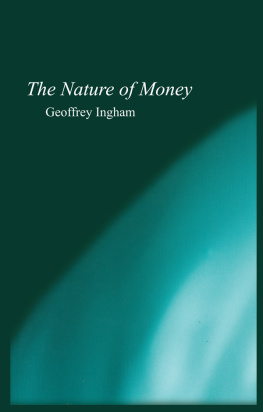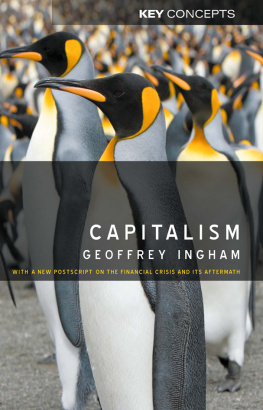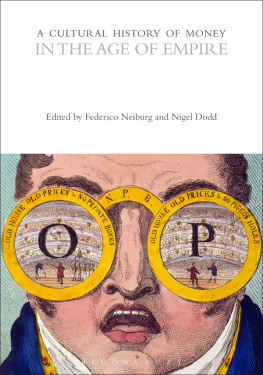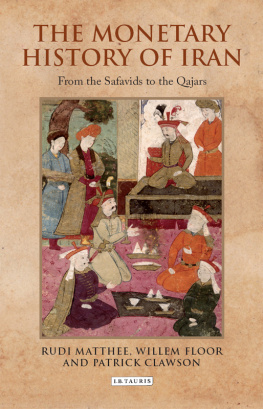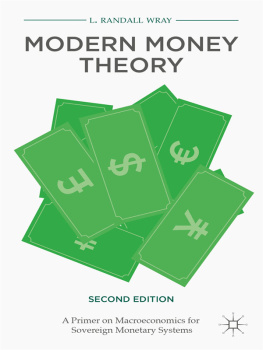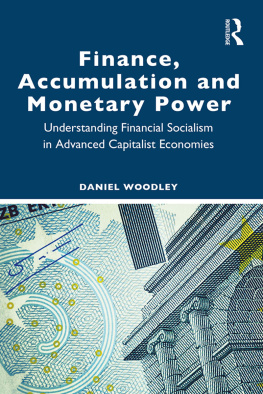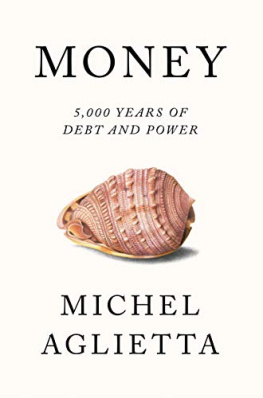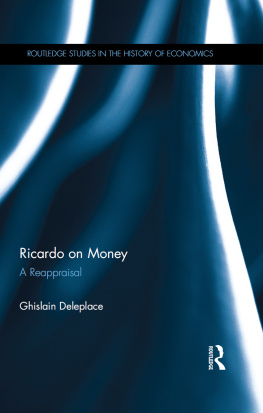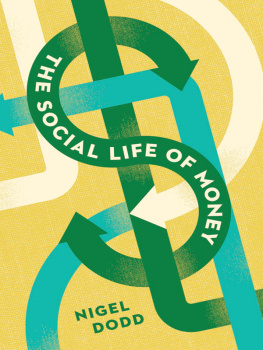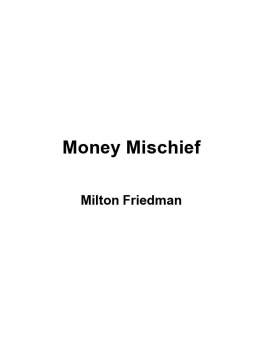The Nature of Money
Geoffrey Ingham
polity
Copyright Geoffrey Ingham 2004
The right of Geoffrey Ingham to be identified as Author of this Work has been asserted in accordance with the UK Copyright, Designs and Patents Act 1988.
First published in 2004 by Polity Press Ltd
Polity Press
65 Bridge Street
Cambridge CB2 1UR, UK
Polity Press
350 Main Street
Malden, MA 02148, USA
All rights reserved. Except for the quotation of short passages for the purposes of criticism and review, no part of this publication may be reproduced, stored in a retrieval system, or transmitted, in any form or by any means, electronic, mechanical, photocopying, recording or otherwise, without the prior permission of the publisher.
A catalogue record for this book is available from the British Library.
Library of Congress Cataloging-in-Publication Data
Ingham, Geoffrey K.
The nature of money / Geoffrey Ingham.
p. cm.
Includes bibliographical references.
ISBN 0745609961ISBN 074560997X (pbk.)ISBN 978-0-7456-3803-4 (eBook)
1. Money. 2. MoneyPhilosophy. 3. MoneySocial aspects. 4. Capitalism. I. Title.
HG220.A2I584 2004
332.4dc22
2003017409
Typeset in 10.5 on 12 pt Times
by Kolam Information Services Pvt. Ltd, Pondicherry, India
Printed and bound in Great Britain by MPG Books, Bodmin, Cornwall
For further information on Polity, visit our website: www.polity.co.uk
Contents
Preface
This book is the result of my long-standing impatience with the disciplinary boundaries of the social sciences in modern academia. Not only have they become sharper, but there is also greater specialization and fragmentation into sub-fields and esoteric niches. Since the division of intellectual labour in the early twentieth century, I believe that there has been a loss of understanding of how the world works. This belief is based on direct experience over a period of almost forty years in the University of Cambridge.
Using the economist Leijonhufvuds (1973) whimsical classification of the social science tribes Econs, Sociogs and PolScis I explained in an earlier paper on money that after initiation in the Sociog tribe, I lived for almost twenty-five years with the Econs in the Faculty of Economics (Ingham 2000b). I became interested in money, and I asked some of their tribal elders for guidance. What is money? Some answered that money, as such, was not really as important as (my) common sense might suggest. I was not convinced, and, in particular, I could not accept the orthodox economic conception of money as a neutral veil. General equilibrium theorys inability to find an essential analytical place for money in its sophisticated mathematical models seemed even more puzzling. I had reached an impasse.
Several years later, I contracted to write an introductory text on the sociology of the basic institutions of the capitalist economy. The first chapter on money has now, several years later, grown into this book. However, this time round, one of the more heterodox Econ elders in Cambridge, Geoff Harcourt, pointed me in the direction of a much more congenial post-Keynesian literature. His assistance gave me the start I needed; I could not have begun without his help. I went back to Keyness A Treatise on Money (1930) and realized for the first time that parts of the first two chapters were unwittingly, but thoroughly, sociological. In effect, chapter 2 describes the social relations of production of bank credit-money. At the same time, I came across the reissue of Schumpeters posthumous History of Economic Analysis (1994 [1954]). As a graduate student in Cambridge in the early 1960s, I had read parts of this wonderfully erudite and intellectually engaging work. It is probably better for being unfinished and unedited by Schumpeter: one can see the process of thinking with all the doubts, inconsistencies and contradictions. As a guide to the history of the economic analysis of money (and much more), it is unmatched.
Lacking the framework of a formal economics education has enabled me to write this unorthodox book; on the other hand, it has posed obvious problems. Deciphering the lexicons and idioms of the different traditions was slow going endogenous and exogenous money took a little time to unravel! (Exogenous to what? At one time I thought that I could find at least three meanings. The reader will be pleased to hear that they do not appear in this final version.) Here again, I must thank Geoff Harcourt; he was the bridge without which I would not have been able to travel between the two tribes. He is always willing to answer my questions and suggest even more reading. The recommendation of the work of the economists John Smithin and Randall Wray has proved invaluable. It is gratifying to know that they in turn have taken an interest in mine. Attention to detail is not my strongest suit. Consequently, I have very good reason to be especially grateful for the highly professional expertise, and forbearance, of Sarah Dancy and her editorial team.
Polity has waited patiently a very long time for this partial fulfilment of the original contract. It is for others to judge whether it was in vain.
Part I
Concepts and Theories
Introduction
Gladstone, speaking in a parliamentary debate on Sir Robert Peels Bank Act of 1844 and 1845, observed that even love has not turned more men into fools than has meditation on the nature of money.
Marx 1970: 64
I know of only three people who really understand money. A professor at another university; one of my students; and a rather junior clerk at the Bank of England.
Attributed to Keynes, quoted in Lietaer 2001: 33
Moneys Puzzles and Paradoxes
Money is one of our essential social technologies; along with writing and number, it was a foundation for the worlds first large-scale societies in the ancient Near East during the third millennium BC, and today it literally does make the globalized world go round. Money plays this indispensable role by performing the familiar list of functions of the economic textbook. Each is fundamental for the continuance of routine life in the modern world.
In the first place, as Adam Smith and the classical economists made clear, a medium of exchange makes for the efficient operation of the division of labour and exchange of products that creates the wealth of nations. This indirect multilateral exchange is a means of translating the work of the farmer into the work of the barber ... [money] is action at a distance (McLuhan 1964: 10). Secondly, and perhaps most remarkably, money is able to store abstract value, as pure purchasing power, for longer periods than is necessary for any particular exchanges. The consequences of this property define the freedom and flexibility of the modern world. As Simmel explained, a feudal lord could demand specifically a quantity of honey and poultry from his serfs and thereby directly determine their labour. But the moment he imposes merely a money levy the peasant is free, insofar as he can decide whether to keep bees or cattle or anything else (Simmel 1978 [1907]: 2856). With money, decisions can be deferred, revised, reactivated, cancelled; it is frozen desire (Buchan 1997). But, [a]ll of these consequences are dependent on what is, in principle, the most important fact of all, the possibility of monetary calculation (Weber 1978: 801). This third attribute of money, as a measure of value (money of account), enables the calculation of actual and potential costs and benefits, profits and losses, debts, prices. In short, money is the basis for the progressive rationalization of social life a process that began, as we shall see, in those empires of ancient Mesopotamia.
However, money should not be seen simply as a useful instrument; it has a

